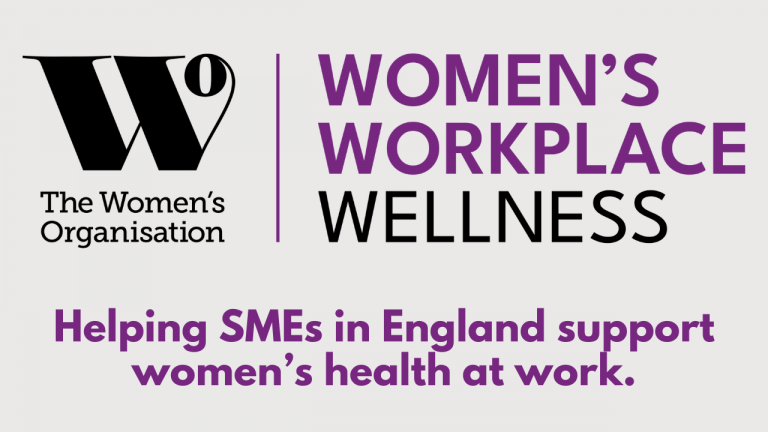With 65% of women feel uncomfortable with discussing their health in the workplace, and one in ten women who worked during the menopause leaving a job due to their symptoms, ignoring female employees’ health needs is costing SMEs. (The Fawcett Society)
The bigger picture? When workplaces neglect women’s health in the workplace, women, small businesses, and the economy pay the price. So where should SMEs start?
The Women’s Organisation are making it as easy as possible with the launched their exciting Knowledge Hub this month. Designed for flexibility and ease of access, this hub is packed with resources to help SME’s cultivate healthier and happier work environment and supportive culture for female employees.
Anne-Marie Swift – Project Lead for the Women’s Workplace Wellness Project dropped by to tell us a bit more.

Anne-Marie – where did the Women’s Workplace Wellness Project come from?
The Women’s Workplace Wellness Project came about in response to The UK Government’s Women’s Health Strategy published in 2022 that highlighted the importance of supporting women’s reproductive health in the workplace and the impact it has on productivity, health and wellbeing, staff retention and development. We are one of 16 organisations across England providing support for small businesses to really make a positive difference to women’s health at work.
So, why should small business owners be interested in the project?
Small business owners might be surprised to know that neglecting women’s health in the workplace costs the UK economy £20.2 billion per year – and much of this is related to women leaving their jobs, having to take sick leave, or switching to part time work in order to meet their health needs. The stats show that women’s health in the workplace must be addressed.
Almost 70% of women have reported that they have faced health issues during their careers and almost a third feel that their employers are not supportive. So, this produces a huge knock-on effect for small businesses as this can affect productivity, and cause challenges with being able to attract and retain really good employees. Also, its everyone’s responsibility to try and ensure that the welfare of their workforce is taken seriously – so supporting women’s health at work is the right thing to do.
Why do you think that small business sometimes struggles to accommodate the health needs of their female colleagues and employees?
We hear a lot from small business owners that they want to be able to support their female employees but it’s often a challenge to know what the right things to do are. Also, many small businesses are anxious about their legal rights and responsibilities as well as what rights their employees have when it comes to aspects such as menstrual health, pregnancy and childcare, and for women experiencing the menopause.
There has been a lot of discussion in the media recently about some of the guidance coming from the government and the department of health about businesses having to make adjustments for women experiencing the menopause. This sits alongside the rights that women have when pregnant and during their maternity leave, and on the horizon is the change in the law about flexible working – where employees will have the right to request working flexibly more often and right at the start of their employment contracts – and employees will have to consider and respond to the request and provide their reasoning if they turn down the request – which is a big change to how flexible working is managed currently. It can be a challenge for small businesses.
So, what can a small business do to step up to this challenge?
This is where the Women’s Workplace Wellness Project can really help. We have developed a comprehensive range of what we call “bundles” containing tools, guides, and information to help small businesses attract and retain female talent by fostering a supportive workplace culture that prioritises women’s health and well-being.
The Bundles cover menstrual health, maternal health and menopausal health at work and include fantastic resources such as “The Small Business Conversation Podcast” where you can gain valuable insights and information from a range of experts in law, health, research, and business as they discuss critical topics surrounding women’s health in the workplace, “The Women’s Workplace Wellness Toolkits” – these specially curated toolkits, developed in collaboration with Morecrofts solicitors, provide small businesses with a wealth of resources, including training materials, policy guidance, and up-to-date legal information, to address the needs of employees experiencing all aspects of women’s health needs. AND – Links to access our “Knowledge Hub” – this is the newest addition to the resources available and enables a way to access additional information and learn more about women’s health at a time and place that suits you and your business needs.

How do business owners get hold of the resources?
Anyone can access these resources for free by clicking on this link:
You will just need to complete a simple registration form and then you get immediate access.
Is there anything else that you want to add Anne-Marie?
Yes – the resources are being updated all of the time and we’re looking forward to loading up a whole range of support and information to help small businesses navigate the Flexible Working changes mentioned previously – so you don’t want to miss that. Also, we are really active across all of our social media channels – in particular LinkedIn so anyone can access our resources and information at any time and on the go!!

